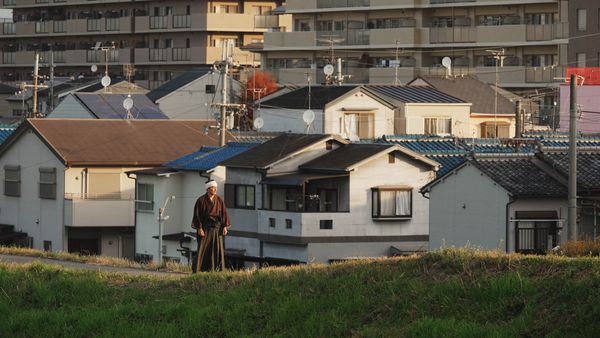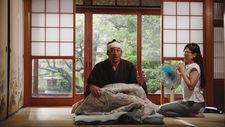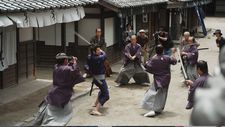 |
| A Samurai In Time Photo: Fantasia International Film Festival |
A huge hit on the festival circuit, delighting audiences and critics alike, Yasuda Jun’ichi’s A Samurai In Time stars Yamaguchi Makiya as a seasoned warrior who is engaged in a duel when he’s struck by lightning and transported 130 years into the future. Struggling to cope with this shocking change, he finds a purpose when he gets the chance to participate in making jidaigeki: historically-set TV series. Gradually, he finds his bearings, feeling great joy at all the positive changes his country has gone through.
The film is currently screening at Frightfest, and last month it was at Fantasia, where, aided by a translator, Yasuda joined me to share his thoughts on making the film.
“Something that I really liked about the Edo period is that at the same time that the samurai were like a working system, all together, amongst themselves, they would disagree a lot, and this would create a lot of fighting as a result of dividing people,” he says. “One side has won, right? And this is what we see when the samurai has traveled in time: he sees that his comrades have won. What was an ordinary fight during that time actually led to something amazing for the present day.
 |
| Yamaguchi Makiya in A Samurai In Time |
“During this scene where he eats the cake and he really marvels at it, this is a scene that I wanted to make in order to show his somewhat relief at how Japan has become a rich country in which one can buy delicious cake for cheap. I wanted to stray, also, from the typical sword fighting and hierarchy scenes. I wanted to show more of the truthfulness and the purity of sincerity among samurai.”
It's a wonderful performance, I observe. The character often seems very sweet and vulnerable. How important was that side of him to getting people to engage with the story?
“This character, despite being a samurai, he was actually an ordinary person back in his time. He was not an especially famous or powerful ruler or anything. He was just a simple person. And even though I did integrate a couple of science fiction elements, it's really a drama, so I needed this character to be relatable. He's not somebody who's above everybody else. He's just like everybody.”
At times in the film, we have two actors who are playing samurai, playing actors, playing samurai, and yet we can always tell sort of what's happening on what level. How was that achieved?
“It turned out to be a bit of a coincidence, but I think all people who were cast really had high skills at acting and Yamaguchi Makiya was especially full of talent. I felt like I was able to make him cry no matter how many times I asked him. During the cake scene, for example, even though this was a movie that I wrote the script for myself initially, my cinematographer actually kind of put a lot of input in there as well.
“A couple of scenes where less happened turned out to be more focused on dialogue, or shifted from what I initially thought of. But the most important thing that I felt I wanted to depict was the reality of holding a blade. In the – I want to say traditional, but also popular –period time pieces on Japanese television, the filming crews often used very light swords that they would slash around. But in this movie, the swords that we use were actually really heavy. So it was actually a requisite that my two main samurai actors were able to wield actual heavy swords.”
There are scenes where the characters are imitating fighting, and then there is a scene at the end where they really want to hurt each other. How did he approach shooting that so that, when watching, we would be able to feel the difference?
 |
| Swordplay, fantasy and reality Photo: Fantasia International Film Festival |
“During the last scene, the two actors are one against each other, and they actually want to hurt each other. In the original scenario, I was imagining them being very scared and awkwardly holding their swords against themselves, preparing for the other one to strike. But talking with the acting director and talking with the actors as well, I was told that, well, since they are seasoned fighters, they should not be afraid at all if they are going to fight an actual person. And that's something that I realised also during the editing, that the fight should feel as heavy as possible and not as light as the other ones that are done mainly for the filming purpose during the movie, like pretending.
“My main point of reference for this was actually bungee jumping. When I thought about what it's like, before you jump, you're like really scared. You're really scared. You hesitate. But once you jump, once you're in the air, that's when everything goes down in just an instant. And that's where everything happens. So I wanted to replicate this abrupt change of pace. That's what I used to make this work.”
Finally, I ask about his feelings on the decline of jidaigeki in recent years.
“It makes me feel very lonely that there are not so many,” he says wistfully. “But I think it can be explained mainly because of cost concerns. They're very expensive to make, and Japan has an economy that is kind of going down recently, so it's not a surprise that they would become rarer because of this. But I think it's also because they're becoming less and less realistic to people's expectations. Like a TV series, for example, has a new bad guy every week. They fight it to the death, and he goes down and next episode there’s another. So people, I think, are less prone to this type of easy peasy scenario. I wanted to also depict more of a warm society from the Edo era, where people, whether it be townsfolk or samurai, do help each other and there's some solidarity there.
“While I do miss those TV series, I think that people are going to be able to revisit them using, for example, Akira Kurosawa's movies, which had this very dark aspect to them. My movie was a different take on the samurai life.”





















